

|
|
Psychotherapy with Women at Midlife and Beyond by Katie Amatruda, PsyD, MFT & Lauren Cunningham, LCSW
|
Chapter 5:
Transformation
Transformation has two distinct parts; the inner and the outer. The inner journey addressed in this chapter includes:

"I'm melting": Finding Feelings
| Suzanna
told me that she cried for a year when her husband died. "I thought the
tears would create channels and grooves in my face. I just felt so
alone. I had never been on my own. I was so young when I married
Ira; I went from my parent's house to his house; from child to wife.
My tears were partly self-pity but I felt lost. I didn't know
who Suzanna was how to find her."
"The tears finally stopped before I completely dissolved. I went back to temple, feeling like I was nothing, nowhere, nobody. Maybe that's why I felt so open to the divine. I feel like I survived the flood when G-d destroyed the world...like Noah. Never could I have imagined such desolation. I lost ten years of my life." "I'm grateful now. Each moment feels like a prayer. I am connected to myself." |
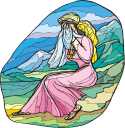
| Gabriela
sat down with uncharacteristic heaviness. As someone who had danced
a lot, usually she was light on her feet and graceful. Not today.
"I want to talk about sex. We never really have. This is hard,
but important." She took a deep breath. "Lately, I have no desire for Peter. I used to want him no matter what else was going on. In fact, more often than not, I initiated sex. Before I married Peter I had lots of boyfriends—sometimes two or three going the same time—that was before AIDS. I felt full of animal passion." A deep sigh followed. "I don't know what to do. I am afraid to go to the doctor. I wear an estrogen ring internally. I heard that some women take testosterone. I'd probably grow a beard. I'm already growing more facial hair like my mother and grandmother." "And Angelique is having sex with her boyfriend. I don't have any proof, but she looks like she is. Peter and his ex-wife don't believe in supervision; they let Jack come over when they are at work, so they can do homework together. I imagine the kind of 'homework' they are doing." Gabriela
and I tried to figure out when her lack of desire had surfaced,
to try to see if we could tease out reasons other than perimenopause
for her low libido. |
Crying is important
throughout our lives. Gaston Bachelard said, "The organs cry the tears the eyes
refuse to shed" in reference to illness appearing when we don't cry.
Water is necessary to moisten the ashes so new life can begin to grow. A solution
may be bringing unanswerable questions to the realm of feeling. Tears and grieving
can alternate with rage. Tears are a way of softening, dissolving the pain,
melting old rigid patterns, allowing for change and cleansing.
I am comforted by the quote
from John Vance Cheney,"The soul would have no rainbow had the eyes no
tears."
| Louise
spent many months talking about her grandson Freddy, his deceased mother,
and her imprisoned son. She felt Freddy needed her complete devotion
to redeem his parents' and her own mistakes. She spent endless hours taking
him to appointments, and spending "quality time" with him at the playground,
the pool, and at home reading to him. She refused to consider using a
sitter for respite. She ached with bitterness towards her husband who
had remarried and begun a new family, imagining that they had everything
she had missed in marriage. She feared that her hateful anger would make
her breast cancer suddenly reappear even after seven years as her punishment.
She remained stoic about her fate and did not shed a tear during this
time.
Louise suffered and emotionally kept me at a distance. Finally, one day I asked Louise if she remembered what the flight attendants say to do if the oxygen masks come down and you are traveling with small children. She scrunched her eyes shut and thought for a minute. Then she opened her eyes and started to grin. "They say to put it on yourself first, because you can't help a child if you've passed out." We laughed together. We continued to discuss the very real and overwhelming circumstances of raising Freddy. While she resisted going to a support group for grandparents raising grandchildren, she set up some respite care for her to have some evenings off. She also became more proactive with the school to arrange more resource services for Freddy. The next session she asked about the sandtray and toys I had on the shelves across the room. I explained that it was a form of active imagination that might help her get to places for which she had no words. She walked over to the trays. She
sunk her hands into the dry sand and stood there for a long time. Her
eyes filled with tears. "The sand feels soft and good. It reminds me
when I was a carefree girl at the sea shore." More silence followed.
"But I feel so sad." Tears started to roll down her cheeks. They fell
onto her hands and then into the sand. After long minutes she looked
up at me and said, "I could fill this tray with my tears." I
felt my own sadness welling up. Then she pushed the sand out to the sides of the tray to make a large blue clearing in the center. She even took out some sand to make the blue area bigger. "This is the pool of tears," she said. "Like Alice in Wonderland." She dropped a tiny "worry doll" into the pool. "She's drowning. It's an ocean that has no bottom and she'll never find the shore." We stood there together watching the tiny doll in the huge sea of sorrow. This began a new time in her therapy when she began experiencing and sharing with me the grief that she had pushed away. |
"Lament is the occasion, the necessary condition, for individuation" (M. Stein, Transformation: Emergence of the Self, pp. 29-30)
Jung
noticed with fascination that his notion of the individuation process was reflected
in alchemical symbolism of the 15th century. Like the individuation process,
alchemy was considered a sacred work starting with the basest material—lead—and
transforming it into a substance of highest value—gold. In Jungian terms the
ultimate value in the personality would be in a connection to the Self. For
women's development in midlife, we are talking about transforming the painful,
rejected parts of our aging selves—the witch within—into a fuller wisdom and
golden grace of the inner queen. Many women we work with find that understanding
their process in terms of alchemical symbolism is helpful because it places
their pain and struggle in a larger context. This is called "amplification"
in Jungian work. Knowing that our individual life story is part of the
greater human story is comforting and gives us perspective. We can view our
lives as an alchemical process in which we are struggling to take the raw matter
of our aging and vulnerable bodies, our volcanic and painful feelings,
our malicious and hateful thoughts, and our wounded spirit—and transform ourselves
into the integrated and compassionate woman that we essentially are.
In this chapter we are talking about "finding feelings" through grieving and crying. In the alchemical process called "solutio" the solid, or static, frozen emotional state, is softened or melted into a flowing liquid—the return to a less differentiated state. When we dissolve the fixed, static parts of ourselves, established attitudes start to be questioned and perhaps discarded. Inauthentic aspects of the personality may start to melt away as the old world that we've known crumbles away. Energies that are worth preserving survive.
This
stage can also be experienced like a return to the womb or a feeling of being
contained by something greater. "Dissolving" may also feel like a fragmentation
or a demonic or ecstatic experience. This might include alcoholism, drug and
sex addiction, or falling in love. Abruptly all is well. Life has begun to flow
again. But this may be a diversion that is destructive to the home relationship.
Danger lies in dissolving in an over-identification with a group, or becoming
immersed in drugs or alcohol in an attempt to reconnect with a larger whole.
The ultimate danger of too much water is drowning or ultimately suicide.
But
an experience of rebirth out of the immersion in our energy flow is possible.
Other images of solutio that show up in dreams, sandplay and other forms of
active imagination include drowning, baths, showers, sprinkling, swimming, immersion
in water, or Noah’s ark. Edward Edinger suggests that the solutio stage "solves"
psychological problems by transferring the issue to the realm of feeling.
This can happen when a woman "dissolves" into tears. Our source on
alchemy here and an excellent overview of how alchemical symbolism parallels
the individuation process according to Jung is Edward Edinger's Anatomy of
the Psyche: Alchemical Symbolism in Psychotherapy Open Court,
1985.
Josephine
continued to share from her memoirs:
Josephine said that she never wanted to be trapped the way her sister had been. She talked with her doctor made the necessary legal arrangements to direct life-sustaining treatments. |
According to Lynne Morishita, a Geriatric Nurse Practitioner:
Advance Directive is a generic term which includes The Durable Power of Attorney for Health Care (DPAHC) and also often a Durable Power of Attorney (over estate, rather than person)--both specific documents which vary from state to state. The Living Will is also an Advance Directive but I don't recommend it. The DPAHC allows one to designate a decisionmaker regarding health care, in the event one is unable to make these decisions oneself. The person who has DPAHC is chosen by the individual and is usually someone who knows the person so well that they have a sense of how the given individual would respond in a decision making situation.
An extremely critical point is that it is important to talk with the designated person--the way these are written, the designee's name is written by the involved individual but the designee doesn't have to sign. There are times when someone is called who doesn't know that they are the DPAHC.
These can be so specific that they can offer options e.g. no CPR but yes IV fluid; no CPR, feeding tube etc. These are renewed every seven years.
They can be done by oneself with no attorneys involved. The DPAHC must be done while the person is cognitively intact--if not, the recourse is to turn to a guardian who has to be appointed by a judge. The DPAHC is recognized as legal document by physicians.
Caveat--Remind people to have the DPAHC document in hand --if they go to a nursing home or hospital where this is not available, medical treatment may be aggressive and against the patient's wishes. The most important factor in medical community compliance with patients' wishes is to develop clear communication between patient and physician.
The following Advance Directive is printed with grateful acknowledgment to Theodore
X. O'Connell, MD and Ashley K. Christiani, MD from their website
http://www.advance-directive.com. It is included in this course
because we believe it is vitally important to mental health to at least be aware
of one's options regarding end-of-life care. While we acknowledge that
for some people these decisions are best left 'in the hands of God' we do feel
that as therapists we have an ethical duty to be aware of the options available.
Please go to the site for a printable document to make a living will and designate
a durable power of attorney
for health care. It is considered a legal document in California but may need
to be modified to be a legal document in other states.
|
Advance
Directive
|
The witch's story continues:
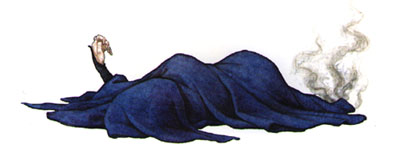
The Candlewick Book of Fairy Tales. Retold by Sarah Hayes. Illus. by P. J. Lynch.
Cambridge, MA: Candlewick Press, 1993.
http://www.scils.rutgers.edu/~kvander/swillustration14.html
She felt terrible. She had really died that night, when she had to dance wearing the red hot shoes. And her husband, the king, never even came to the wedding. Here she had been left to raise the princess, while he was off in the world, and he didn't even show up at his daughter's wedding. Well, she 'd be damned if she got stuck with the bills!
She pulled herself up, and looked around. She was in a desert. It was bleak, no water, no trees to shade her from the relentless sun. A charred lump was near her; it was the only thing in the entire landscape. It emitted a slight smell of burnt ginger. The Witch was truly alone. She had nowhere to hide. Her ravens were still with her, but they seemed more like vultures in the stark light. She had to face things now. Snow White had married the Prince, and the Witch had to admit that she was no longer the most beautiful in the land. In fact, looking at her burned and scarred feet, she felt only pain. And she began to feel some thing else; a glimmer of remorse. The tiniest bit of regret at how she had treated her stepdaughter, and all of her beautiful power that she had wasted in trying to do her in. In all the beaches of the world, this feeling would be only as big as one tiny grain of sand, but it was a bit of remorse. And with that feeling, a raindrop fell.
Soon the rain became a deluge, and the Witch again had nowhere to go. She remembered her sister witches, who had been melted by water. One was the Wicked Witch of the West, who disappeared when Dorothy dumped a bucket of water on her. The Witch remembered it well; when the Witch of the West screamed, "See what you have done!...In a minute I shall melt away....Didn't you know water would be the end of me?...Well, in a few minutes I shall be all melted, and you shall have the castle to yourself. I have been wicked in my day, but I never thought a little girl like you would ever be able to melt me and end my wicked deeds. Look out - here I go!" And then she "fell down in a brown, melted shapeless mass and began to spread over the clean boards of the kitchen floor." (Baum, L. Frank, The Wonderful Wizard of Oz, (1987) New York: Books of Wonder. p. 154)
The Witch heard moans,
which she knew were the wailing voices of 29 witches. These witches had lived
outside a little village, and had loved nothing more than flying their brooms
on the night of the full moon. They so terrorized the people that everyone
hid inside on those nights. In the village was a grandmother who wanted only
to see the full moon before she died. She went to the wise Rabbi, who
had noticed that when it was raining on the night of the full moon, the witches
stayed in their cave. He resolved to trick the witches, which he did by
having all the men of the village go to the witches' cave on a night when it
was raining, each secretly carrying a pot containing a dry white robe within
it. The rabbi convinced the witches that he had great powers, most especially
to walk between the raindrops, and to make 29 men appear. The men of the
village entered the witches' den, having earlier changed from their wet clothes
into the dry robes, and danced the witches out into the rain, whereupon all
the witches melted.
(Rabbi and 29 Witches, A Talmudic Legend, Marilyn Hirsh, Holiday
House, N.Y. 1976)
She knew the Wicked Witch of the West was out there somewhere, in the rain, with the 29 witches. Witches, you see, don't die. They go somewhere. When our Witch arrived in the desert, the charred lump she saw was the witch from Hansel and Gretel. That witch had a much longer journey back, as her whole body got burned. Our witch, having only burned her feet, was in much better shape. But she knew that the Gingerbread witch would be back, someday.
She mused to herself, as the rain came down. "I know how to deal with this. Witches are adept with the elements". She thought about witches that could soar through air, or create fire, floods and earthquakes. "In fact", she spoke aloud. (During all the years when the king was gone, she had developed a habit of talking to herself, which seemed to get worse with age.) "It isn't fair. If we were men we would be Merlins, great magicians. It is only because we are women that we are treated so poorly. After all, we do the same training they do, and work with the elements the same as them. It is rotten! Why, in the olden times, before time was measured, WE women had the power, not the men!
And of course the reason we have power when the moon is full is because that is when we bleed. Menstruation is a time of power for women...what people have forgotten is how much more powerful menopause is, when we keep our blood and power!"
She realized with regret that her arrogance had kept her from taking the 'fire-walking' classes offered in the eighties. Had she taken one of those, she would have walked right over the fire in the iron shoes. Now, with all the water around her, she started to swim. It was tempting to just sink down, but she realized that in water, she had two ways to go; crudely put, sink or swim. Sinking would be to stay in the water, to drown in self-pity, or drink, or just slowly becoming a raisin. Or just merge into the water, finding other lost witch souls, where they could complain about the evil princesses that put them there. In fact, there was a slight sound of muttering. She avoided it, knowing its dangers. To ally with the muttering witches would be to stay forever a witch, in the water. There were dangers to hanging around complaining; the primary one being that she would never truly face herself, and mourn her life.
Swimming - that meant
to feel. Feeling was the harder path, but it was the one she had started
with the glimmer of remorse. She began to cry, mourning her own life.
She grieved the decisions she had made, and paths both taken and not taken.
She avoided (most of the time) the deep watery abysses of self-pity, from which
some people never emerge. She was sad, and so she cried.
The Departure: Getting Lost
| Suzanna
finally decided to sell her house that she had owned for most of her adult
life; the home she and Ira had created for the children. It was
a rambling house, comfortable, well lived in and well loved. It took her
5 years of intermittent work to declutter and get rid of her possessions.
"I found ball gowns that I had worn in the 1950s! I should have donated
them to Goodwill years ago, or given them to the kids for dress-up.
I had trouble letting go of the past."
She got rid of almost everything except her jewelry, silver, family photographs, her sewing machine and her lace wedding dress. She left her daughter Jane and her grandchildren standing in the driveway waving good-bye. Suzanna felt excited and terrified like she was going off to college with her car packed to the brim. Ten miles outside of town she took a new exit and promptly got lost. |
In our everyday lives most of us experience "getting lost" as very unpleasant.
However, getting lost is an integral part of an individuation
process. The condition of being "lost in the woods" in fairy tales and myths
signals the entry into unknown territory or the unconscious. However, when we
feel that we have lost our way it signals that we've actually "left home" or
embarked to a new place. Sometimes a woman in
midlife will finally "leave home"
and establish a new identity that is independent of dutiful daughter,
loving wife, unconditional mother, and relentless worker. As her children grow
up, her parents age and die and her relationship with her partner readjusts
or even ends, a woman's life focus must shift. She is released into unknown
territory. Neither map nor operating instructions are provided. As much as a
woman may or may not be ready to leave her life as a young woman, she
is thrust out by the change.
| Weslia
came in and began to talk about Sue. "I am not not sure what is going
on with her. She says she feels lost these days. She's always been
so focused on her work that it was hard to find her. Now,
something is different. At first I thought she was having an affair,
but she's not. It is almost as though she can't locate her internal
compass. She is scattered, which Sue never usually is. She
doesn't focus at work, and she came home early a few days age to spend
time with me and the kids. But then she got irritated by Danny's
burping and farting noises, so she drifted off. And Sue doesn't
drift!" "She didn't become mad, like she usually does. Things are strange. I don't know what to make of it. I'm a little afraid. She said she wanted to cut back her hours at work." |
I listened with interest
to Weslia speak of Sue. For both Weslia and myself, Sue represented "the path
not taken," the woman who had made her career her primary goal. Filtered
through Weslia, I had learned that Sue was enormously successful and commanded
a high salary. I met Sue once at a restaurant. She had a precision haircut
and impeccable makeup. She wore an elegant black suit and designer shoes. Weslia
often complained that Sue valued her career over her relationship or her children. I
could experience that sense of discontentment and inferiority alive in me too.
I brought the focus back to Weslia. I asked her what frightened
her.
| It
is upsetting to see Sue like this. If she is unhappy at work, will
she be unhappy with me? And what if she hangs around more. She is
so impatient with the kids! I can't imagine her tying Emily's shoes,
much less teaching her how to tie them." "It's hard. You fall in love with someone. And even though they drive you crazy, it's probably the things that made you fall in love with them in the first place. I am afraid of Sue changing." |
Sue and Weslia had
been attracted to each other as opposite types. Sue had a well developed animus
and had achieved success in a man's world. With her competitive, ambitious spirit
she could "play the business game" comfortably, without taking her failures
or disappointments personally. She was a tough negotiator and shrewd judge of
character. Weslia had stayed home to nurture children. While Weslia needed
to "find herself" separate from her mothering role, Sue had a different path
for her individuation. Perhaps Sue was realizing some of the deficits of her
lifestyle and was envying Sue. Sometimes when one person starts to change in
therapy their partner becomes disquieted about their lives too. Change is unsettling
and reverberates back and forth between individuals in a couple.
| Josephine
often spoke of the time in her life after she retired. She felt utterly
lost. At first she woke up every morning with her brain full of
school matters only to slowly remember that she was retired. She
said, "I had to shake myself out of a slump. I'd been working my
whole life, starting as a young girl. I didn't know how not to work.
And I'd seen too many people, who just rolled over and died after they
retired. I knew I had a lot of living and loving left to do.
But I didn't know where to start. I didn't know about not
working. The idea of 'stop and smell the flowers' was alien to me." "I also had a hard time with the 'not knowing. Having been a teacher, and then a principal for so many years, I didn't know how to not know." Her laugh filled the room. "I have come far to be able to say this. At first there was so much shame in not knowing." " I met friends for lunch, but that got boring. My working friends talked about work and my non-working friends talked about their grandchildren. I hate bridge and I'm not bingo playing woman. TV and the popular culture are an anathema to me. So I started walking all alone. One day I really got lost. And it was exciting. I realized that for my adult life I always knew exactly where I was. And here I was, in a new place." "So I started to travel. I visited every continent except Antarctica. Sometimes I took my nieces, sometimes I went with Ivan." Ivan was a younger man who often escorted Josephine. Josephine deflected all curious inquiries. Once, when pressed, she smiled and said, "A woman needs a little mystery." "Mostly I traveled alone. Me, the granddaughter of a slave, traveling to Africa, Europe, Asia, everywhere on my own. I loved it. I never went with a group. And when I traveled to Africa, I started to keep a journal about my family history. That is where my memoirs began." |
Energies from the witch archetype can also help the woman to:
New directions can open to her. It's time to take stock and to re-create herself. Ready or not...here she comes!
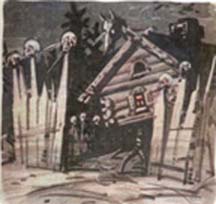
As the last tear was shed, the Witch emerged from the water. (In fact, the water receded from her as the tears dried up.) She looked around; she did not know where she was. Desert had been replaced by deluge; now here was a forest. The trees were ancient, towering above her. She started out on a course, following the moss on the trees, which was supposed to be on the north side of the trunk. But then she saw a distinctive tree, one that had been split by lightning. The problem was that she had already seen that tree, so she realized she was going in circles.
She didn't know what to do. She was truly lost, and it was getting very cold and dark. The Witch began to panic, then get mad. "I am not a person who gets lost! People like Rapunzel get lost! Stupid third sons and stupid third daughters of kings get lost! I am someone who always knows where I am, and where everyone in the kingdom was! At all times! I was famous for being in charge. Everyone in the kingdom depended on my sense of direction, and knowing the lay of the land!" The trees were nonplused by her little tantrum. They just stood there, tall, quiet, a presence in the woods.
The Witch realized that her ranting and raving were not going to change a thing. It was getting very cold now, and even darker. She was still too waterlogged to create fire, so she found a cave for shelter.
The Sacred Cavern: Retreat and Solitude

| After
Louise and I had spent many sessions together experiencing her sadness,
she said she felt "relocated" deeper in herself.
One day Louise went to the sandtray and created a lake "high in the mountains." Rocks and trees filled in the landscape. A woman, "traveling lightly" walked along a path of pebbles that led to the other side of the lake. As Louise carried several animals from the shelves to the tray, one fell on the floor. She placed a bear, some rabbits and a kangaroo in the tray. It was the baby kangaroo that had dropped out of its mother's pocket and fallen onto the floor. Louise didn't notice. After the session, she decided to have Freddy stay with a friend and to go on a silent meditation retreat. |

Life often forces a woman into a retreat from her familiar roles. A desire to go on a retreat, a pilgrimage or to travel on her own may grip her for the first time.
Fairy tales such as Sleeping Beauty address the necessity for a young women to introvert from a period of time during adolescence.
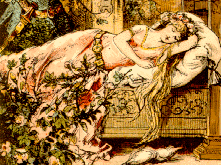
Snow White slept in the glass coffin while she matures from her latency aged concerns of housekeeping for the seven dwarves. Her entree into sleep is through the apple, which is symbolic of the knowledge of good and evil, at least in western Judeo-Christian cultures. The apple is red.
.
![]()
Sleeping Beauty sleeps for one hundred years, awaiting her prince. The method by which the sleep was induced was the 'prick of the spindle'. "But scarcely had she touched the spindle when the magic decree was fulfilled, and she pricked her finger with it. And, in the very moment when she felt the prick, she fell down upon the bed that stood there, and lay in a deep sleep." (http://www.vcu.edu/hasweb/for/grimm/dorneng_pics.html)

However, mature women also may need time to reflect upon their changing lives. Inspiration comes in nature's seasonal cycles and early Indo-European sources that encourage a time of introversion and introspection. Much as a seed must have a period in the darkness of the earth, new life germinates in the darkness before coming into the light. Helpful metaphors include the mythology of the:
These are the settings for the successful initiation, the healing of the witch's failure in the secret room. New growth can begin because she has lost everything. An important part of this process is to go inward, turning away from the collective's mirror to effect transformation. Nature provides an example of introversion and retreat in winter when sap descends down the branches of trees, leaves drop and bulbs are underground, awaiting the return of spring to blossom. Some plants (lilacs and peonies) can't blossom unless they freeze in the winter. Animals that hibernate are another example of the necessity of time to rest, to recover, and to replenish energy stores for later emergence.
Sometimes we must retreat from our lives, from the caretaking, the demands on our time and attention. For some women, illness or depression demand separation from their daily duties and provide hours of quietude.
Depression may come at midlife. The feeling of these states is dark, lonely and cold. For some a biochemical depression can flare up, sometimes in conjunction with hormonal shifts. Some may have a history of being depressed since childhood. Their mother or grandmother may have showed unrecognized signs of depression. Women with both a personal and familial history of depression may find antidepressants helpful.According Britannica on-line:
It is estimated that the annual incidence of major depression is about 140 for men and 4,000 for women per 100,000 population. While the rates for major depression in men increase with age, the peak for women is between the ages of 35 and 45.
http://www.britanicca.com/bcom/eb/article/6/0,5716,118186+10+109830,00.html
Depression may also be viewed as Marie Louise von Franz wrote: "The purpose of a depression is to depress" — a call from the psyche to go inward, to retreat from the world:
Many creative people start their creativity with terrific depression. They have such a
well-constructed and strong ego consciousness that the unconscious must use very
strong means-send them a hellish depression-before they can loosen up enough to
let things happen. I have noticed that people who tend to have those creative
depressions, if they can anticipate them by playing, need not have the depression,
and whenever one can induce a person in such a heavy depression to start playing
in some way, the state of depression is lifted at once, for the secret final intention of
that kind of depression is, as the word says, to depress, to lower the level of
consciousness so that these processes can come into action.(Marie Louise von Franz. Creation Myths. Revised Edition 1995. Boston: Shambhala p.37)
| Louise
was in good spirits when she returned from her retreat. When I first
met Louise she seemed exhausted all the time and didn't sleep well. I
became sleepy during our sessions, which is often my body's way of telling
me that I am in the presence of a depression. Yet now she had come to
a new place. She had plenty of energy
to vent her fury,
about her alcoholic husband, her divorce, her poverty level, her addicted
and imprisoned son, her dead daughter-in-law, her demanding grandson and
having had breast cancer. She quoted Mary Stuart (Mary Queen of Scots),
"No more tears now; I will think upon revenge." She moved on
towards discovering her true nature.
On her retreat Louise remembered loving the book The Secret Garden when she was young. Her reluctance to join support groups was part of her introverted nature. Once she started taking better care of herself, Louise began to go inward, gardening and beginning yoga. After her retreat she told me that she had been with Freddy at a park. She heard Freddy crying; he had fallen off a swing. By the time she got to him, another mother was already there, comforting him. The two women began to talk. Louise realized that this person was Glen's new wife. Far from the 'sexy young thing' of Louise's imagination, Nina was a slightly overweight, plain woman. Louise felt shocked that this woman had not only comforted Freddy but was actually nice. Nina's children and Freddy played well together, and soon Nina had mobilized Glen to arrange to meet Freddy. Glen had never met his grandson. |
The Witch looked
around the cave. It was dry, so she stood there with water streaming from
her body. She began to look around, and then tripped. She leaned
down and felt the ground. It was a bone that had tripped her. She
was sad, remembering when she thought she had eaten Snow White's heart and liver.
"I was so mean and jealous" she thought. "Why?"
Then she realized that if a bone was in the cave, it might
be dangerous for her to be there. She noticed a peculiar smell, a rather
strong smell of animal. She quietly stood and continued her exploration,
but found nothing; only a ratty old bearskin in the corner of the cave.
Exhausted, she collapsed into the bearskin.
She had a peculiar dream. It was as if every fairytale
princess came to her that night. They weren't taunting her, though, but
sleeping. Sleeping Beauty was there, sleeping for 100 years. There
was Snow White in her coffin, and the Princess and the Pea, tossing and turning,
but still getting some sleep. Even Dorothy slept in the field of poppies!

The funny
thing was how peaceful they appeared, and the Witch realized that they were
trying to tell her something. It was almost as if they were encouraging
her to rest, to heal. Then the Witch perceived that she had never really
rested, her whole life. And that maybe these princesses got to the end of their
stories because they stopped and slept.
Perhaps, she wondered, when her husband
the King left to go do kingly things, if she had only stayed at the castle,
and 'let the brambles grow and grow' she might not be in this predicament. She
remembered reports from her friend The Thirteenth Fairy, about what had happened
when Sleeping Beauty turned 15. 'All around the castle a brier hedge began to
grow and grow. Each year it grew higher and higher until in the end it surrounded
and covered the whole castle and there was no trace of a castle to be seen,
not even the flag on the roof. '...I should have thought of that for myself",
and with that awareness, deep deep sleep came to the Witch.
The Animals Arrive: Regaining Energy

| Weslia
came in looking excited. She chatted a bit, talking about how well things
were going. Then she told me her dream: "I dreamt that I got a phone call that Audrey Hepburn, the actress, had died at midnight. The clocks in my house are all set ahead (so we can fool ourselves and get to places on time) so I knew I had time to call Audrey and say good-bye. I called her and of course didn't want to say 'You are dying in 15 minutes' so I just said "I know you are going on a journey." It felt very peaceful." Weslia felt this dream helped to heal the wound created by Great attacking her and then leaving and dying so quickly. "I don't know why it feels so good, maybe Audrey Hepburn showed me a different way to age, or maybe it was being able to say good-bye. My mom said that Great apologized to me on her deathbed, and said she knew what happened with the latch was an accident. I was only nine when she died, but I knew my mom was lying. There were no deathbed scenes with Great. She came in mean and went out mean." Weslia's eyes shimmered with tears. "I loved Audrey Hepburn. She was so gracious and vital. She strikes me as standing tall, not rigid like Great, but tall and flowing...maybe I can do this journey differently from Great...I hope so. Maybe the clock part means there is still time." |
Weslia
had been caught by the witch as surely as Hansel and Gretel. The introject
of "Great" had haunted Weslia throughout her life. I felt touched by Weslia's
dream. She is truly caught between two life forces: young children at home and
an ill and demanding mother. Weslia's unconscious had provided her with the
image of Audrey Hepburn, another way to age. When she talked about the
dream, Weslia's posture changed. She sat taller, and her movements lightened.
Her breathing deepened and she looked less constricted. The laces from the witch
had loosened.
Previously, when Weslia talked about her
mother and 'Great', I often pulled back from her. I didn't like to think of
my own old age. Would my 'hot, cranky part' come to the fore? Or Alzheimer's?
Or cancer? I too welcomed the dream of Audrey Hepburn.
A few weeks after her dream, Weslia
came into the session very excited. She had discovered a community theater,
and was going to try out for a part in a play. I realized that I was jealous.
After a period of withdrawal
new life emerges, often heralded by the arrival of dream or real animals into
the woman's life. In mythology witches often have "familiars" and can take the
animal’s form when necessary. Familiars can bring the injured witch
or wizard back to life, by activating the instincts, can be injured (for example,
a child kicks a cat, next day the old woman living in the cottage is walking
very strangely) and can be used to trap the witch. The appearance of the "familiar",
signals the magical transformation of the witch into an animal's form as a part
of the return of instinctual power and the wisdom and energy it brings. The
archetypal basis for this is "our Lady of the Beasts" a manifestation of the
great goddess.
Crows and ravens are
often associated with witches and are capable of knowing the future and of telling
the hidden truth. Birds represent intuitive hunches: creatures which fly
in the air, in the medium of the spiritual world and have therefore to do with
involuntary thoughts which are revealed to be true. In European
mythology birds can be a messenger between the gods and mankind.
Noah first sent out a raven to find land, but it got so busy eating the corpses
it never returned, thus the dove went out. In Greek mythology it belonged to
Apollo, the god of the sun.

The raven is thus a messenger of the more unknown, the darker, less shining, and more invisible side of the great god. Melancholy, deep thoughts, and evil thoughts are very close to each other: the effect of loneliness is both a precondition for possession by evil and, for exceptional people who know how to behave in it, a precondition for reaching the inner center. von Franz, Shadow and Evil in Fairytales (p. 252)
The witches’ birds are crows, ravens and owls because they are
believed to be capable of knowing the future and of telling the hidden truth.
Cats are also associated with witches; their independent and autonomous spirit
is a shared feature of both witch and queen.
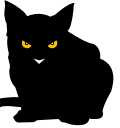
| Gabriela
came to the session with downcast eyes. "I better tell you my dream
first, because it was so disturbing otherwise I might spend my whole session
talking about Peter and Angelique."
"The dream started in a jungle. I was scared. It was creepy. Vines were clinging to me. I felt like I had been there forever, lost. Then I found some steps. I climbed up and up. At the top was a flat stone. Some men came toward the stone. They wore odd head dresses. The men carried an animal." Gaby took a breath and tears filled her eyes. "They took the animal, he was like a small bobcat, a spotted cat. The men put the cat on the stone. And they killed the cat. They cut out its heart. Then I woke up." Tears were streaming down Gabriela's face. "The poor little animal. It was so vulnerable, and they just killed it." Gaby had been in therapy long enough to appreciate that each character in a dream could symbolize a part of herself, so she knew that she was the observer, who had been lost, the wild cat, and the murderers. She was shaken by the dream, then she asked me what I thought it meant. My mind jumped ahead but I remembered my teacher, Jungian analyst Hayao Kawai, who talked about the importance of the therapist not knowing. I also remembered learning in graduate school that "the best interpretation is the one you don't make." So, taking my own deep breath (and my narcissism in hand), I told Gabriela, "I don't know." I asked Gaby what she thought it meant. She associated to the images, then her voice trailed off, saying,"I don't know...there is something more there..it is mysterious to me." I suggested that we just sit with the dream and see what developed. The next session when Gabriela came in, her eyes were glowing. 'I did it," she said. "I understand what this dream is about. It wasn't a bobcat, it was a jaguar. For the Mayans Jaguars were lords of the underworld and protectors of rulers. But sacrifices were made to Chac-Mool, the messenger of the gods. A priest would cut out the beating heart of a human sacrifice. It was thought that the person would see his still throbbing heart placed in Chac-Mool's sacred basin. It was believed that the sacrificed person lived afterwards in a special paradise." "I think my dream is a hard dream, but a good dream. Something in me has been sacrificed, but maybe my heart will be more open. It's not the Catholic God I grew up with, but maybe an older god from my ancestors." Gabriela's dream and the meaning that she made of it seemed to have risen deep from her ancestral and cultural unconscious to help heal her pain. |

The Witch finally
awoke. She was so warm, snuggled into that ratty old bearskin. It
did stink however. Then she noticed it was vibrating. With
a start, the Witch realized that the bearskin was inhabited by a bear!
Her heart started to pound. She felt a scream rising
her throat, but she silenced herself, knowing that if she made noise, she would
awaken the bear. She was very frightened, and did not want to make any
sudden moves. She wondered about how she could have spent the night with
a bear, unbeknownst to her, or, apparently, the bear.
The Witch had dried out enough to make a little fire in
the cave, as far way from the bear as she could. She tried to leave the
cave, but it was as if there was some enchantment over the entryway. As
easy as it was for her to get in that rainy night, she couldn't leave.
What the Witch didn't know until later was that as the Witch
slept by the bear, the bear dreamed of the Witch. The bear was a Grandmother
Bear; her children had long ago left the den. Grandmother Bear was dreaming
of a cranky little bear cub who needed both love and limits, which of course
mother bears are most excellent at providing.
Eventually, the bear woke up, inordinately pleased to find
what she thought was the cranky cub of her dreams in her cave. Grandmother
Bear was also surprised, because she thought she was beyond her childbearing
days. Bears conceive their young in the Autumn, then the embryo implants
as hibernation starts. The cub grows in utero while the mother sleeps, and hibernation
ends when spring arises and labor pains wake the mother .
Grandmother Bear's eyesight was very bad, and she tried
to lick this new grumpy daughter into shape, the way bear mothers do.
The Witch knew none of this, and when the huge and smelly tried to lick
her into shape, she threw quite a fit. She thought she was about to be eaten!
But Grandmother Bear just hugged her with both arms, until the Witch was totally
contained in bear fur.
Finally they introduced themselves. The Witch was
very glad that the bear was a Grandmother Bear, fearing that she would not be
up for a Beauty and the Beast type saga. And Grandmother Bear was glad
to have someone to whom to pass along her wisdom.
The Witch stayed
with Grandmother Bear for many years, some say as long as Snow White was with
the Dwarves, some say for as long as Sleeping Beauty slept. The cave door
opened, so the Witch could go out and get food, firewood and herbs. Grandmother
Bear taught the Witch healing properties of herbs, and so the Witch balanced
the knowledge she had of the destructive properties of the natural world.
The Witch learned many things from the bear, but mostly she learned about being
held and being loved.

888-777-3773